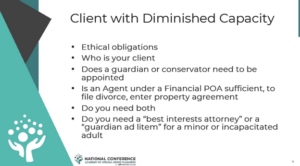Source: Academy of Special Needs Planners Annual Conference Session
This past spring, an Academy of Special Needs Planners 2024 National Conference session led by Emily Kile of Kile Law Firm, PC offered attendees guidance on navigating the sorts of unique challenges that come up in divorce cases where the children or spouses have a disability.
In such situations, special needs planning attorneys will often need to work with family law attorneys or personal injury attorneys. “Our job when we’re brought in,” Kile said, “is to spot what the issues are. As special needs planners, we have a unique perspective on things to think about for the family that go beyond just the money – even while we’re trying to maximize the assets and the income for that family.”
 Divorcing Parents With a Special Needs Child
Divorcing Parents With a Special Needs Child
In the case of parents who have a child with a disability, the day-to-day changes that may potentially accompany divorce raise numerous, complex questions that reach beyond the child’s continued access to government benefits.
For example, Kile asked, what does it mean when parents have made their house accessible for their child and now they need to move? How will they cover the costs of modifications made elsewhere? What effect might a new school or new providers have on the child? Issues related to guardianship of the child after they turn 18 or their transition to adulthood may also arise in divorce proceedings.
“As special needs planners, it’s not just about the law, and it isn’t just about the benefits,” she said. “It’s our holistic perspective on how we can best take care of that family. That’s what our goal is.”
For instance, she may recommend to divorcing parents that they keep the family home. One parent can come and go for visits, while the child remains in their school system and among their network of neighbors and friends. Even if the parents no longer get along, doing what is in the best interest of the child is key.
Among parents who may be more affluent, some do not want to deal with the Social Security system and resist the idea of securing Supplemental Security Income. Yet programs like this may prove indispensable to the child for years to come.
“My argument always is, I don’t have any idea what it’s going to cost for your kid’s needs into the future,” she said. It’s essential, she added, to be “thinking down the road as to what the benefits are that we’re giving up.”
Divorcing Couples Where One Partner Has a Disability
This “thinking down the road” dynamic is just as important, Kile said, in a case where an incapacitated spouse is facing divorce.
For instance, if one spouse has a pension, that pension will no longer benefit the divorced spouse. Likewise, a now-divorced spouse of a veteran will no longer be eligible for their former partner’s non-service-connected disability benefit.
“Now we have a loss of that income,” she pointed out. “How are we going to make up the difference?”
Again, some clients may say they want to avoid relying on public benefits. Yet, Kile said, certain services or housing options are available only if the person enrolls in a program like Medicaid.
“We just don’t know what the future holds. So, maximizing the benefits, at least in my view, is important,” she said, “or, at least that [the clients] understand what it is that they’re giving up.”
In some divorce cases, appointing a guardian or conservator may become necessary for the spouse with the incapacity. Other times, a financial power of attorney is sufficient when they are filing for divorce.
Either way, as the special needs planner, Kile reminded attendees that they need to be sure they understand which spouse they are representing, where the client with the disability is on the spectrum of incapacity, and what their ethical obligations are to that individual. Kile, who does estate planning as well as special needs planning and trust administration, also recommends considering whether there are any potential conflicts of interest at play.
Beyond Special Needs Planning
In addition to going on to cover various aspects of child support payments and spousal maintenance as well as the use of special needs trusts, Kile advised special needs planners to connect with family law attorneys in other contexts. This might be through offering continuing legal education courses on special needs planning or otherwise maintaining solid professional relationships. “They need us, and we need them,” she said.
For example, Kile provided session participants with a checklist that she shares with family law attorneys post-divorce. Items on the list relate not only to special needs planning, but also other important to-do’s not specific to special needs. Among them are the following:
- Update all beneficiaries on accounts, IRAs, life insurance, etc.
- If on public benefits, remind the client to tell all government benefit programs about the change in address, household members, income, and assets
- Recommend updates to estate planning documents
- Change safe deposit box
- Be sure all deeds to transfer property are signed by all parties
- If there is an existing guardianship and any names have changed, remind the party to file a request to amend the Letters of Appointment and Orders of Appointment
- Assign child support or spousal maintenance, via court order, to a special needs trust, if applicable
- Apply for Medicaid post-divorce if necessary

Recent Comments